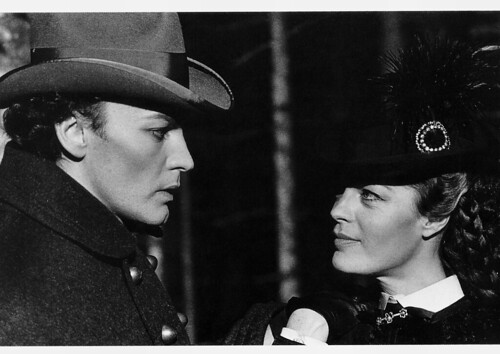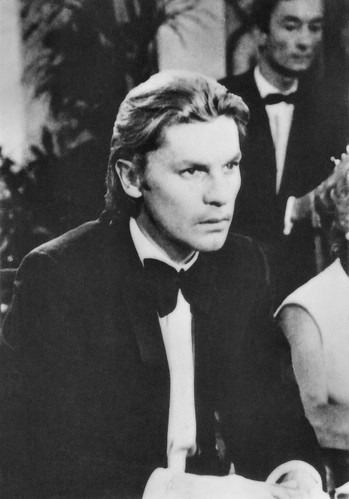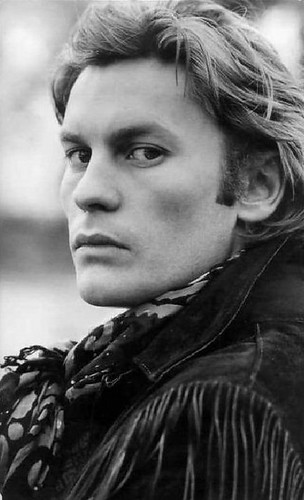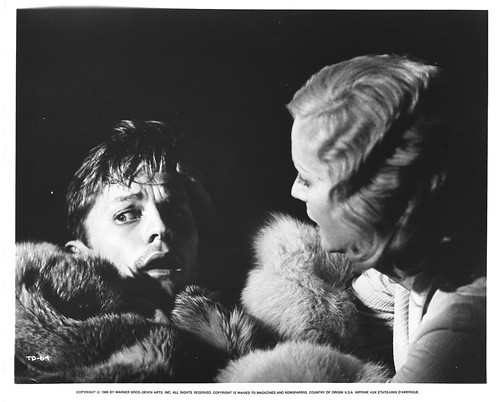
Romanian postcard by Casa Filmului Acin.

French postcard by Sofraneme, Levallois Perret, no. CF 335. Photo: Helmut Berger in La caduta degli dei/Götterdämmmerung/The Damned (Luchino Visconti, 1969).

American or British publicity still. Photo: Warner. Ingrid Thulin and Helmut Berger in The Damned/La caduta degli dei (Luchino Visconti, 1969).

French postcard in the Collection Cinéma by Editions Art & Scene, Paris, no. CI 16, 1996. Photo: Mario Tursi. Helmut Berger and Romy Schneider in Ludwig (Luchino Visconti, 1972).

French postcard by Ed. Sofraneme, Levallois Perret, no. CP 312. Helmut Berger in The Romantic Englishwoman (Joseph Losey, 1975).
A demonic, insane and sexually perverted man
Helmut Berger was born Helmut Steinberger in Bad Ischl, Austria in 1944. There, his parents ran a humble pub after World War II. His father was held prisoner of war by the Russians and didn’t return until three years after the war was over. Young Helmut’s wish to be an actor caused much argument with his parents who wanted him to go into the hotel business. He had to help serve beer and to study for a hotel diploma. At age eighteen, he moved to London, England, where he worked as a waiter to pay his way through drama school, and also joined a small theatre.
With the aim of becoming an international actor, he joined Perugia University to learn Italian, English, and French. He spent some time in France, where his acting career began in commercials and a bit role in La Ronde (Roger Vadim, 1964) with Anna Karina.
Berger then moved to Rome, at that time the film capital of Europe. He was noticed by Luchino Visconti during the shooting of Vaghe stelle dell'Orsa/Sandra (Luchino Visconti, 1964) featuring Claudia Cardinale. Berger was shivering in the cold and Visconti told an assistant to offer a cashmere muffler. The next day Visconti invited Berger for lunch, and so began their relationship. They stayed ‘longtime companions’ till Visconti’s death, twelve years later.
Berger got his first real role opposite Silvana Mangano in the episode La Strega Bruciata Viva/The Witch Burned Alive (Luchino Visconti, 1967) of the anthology film Le streghe/The Witches (1967). He had his international breakthrough as the young heir Martin von Essenbeck in La caduta degli dei/Götterdämmmerung/The Damned (Luchino Visconti, 1969) starring Dirk Bogarde and Ingrid Thulin. This drama tells about the collapse of a wealthy, industrialist family during the reign of the Third Reich. In what is perhaps his best-known scene, Berger mimics Marlene Dietrich as Lola Lola in Der blaue Engel/The Blue Angel (Josef von Sternberg, 1930). Berger was nominated for a Golden Globe Award for his role.
In Ludwig (Luchino Visconti, 1972), Berger portrays Ludwig II of Bavaria from his blooming youth to his dissolute final years. In 1973, he won a David di Donatello – the Italian equivalent of an Academy Award – for this amazing performance. Berger also starred with Burt Lancaster in Gruppo di famiglia in un interno/Conversation Piece (Luchino Visconti, 1974). Berger often portrayed anguished souls and sinister villains and Visconti is said to view Berger as the very image of his idea of a "demonic, insane and sexually perverted" man.

Vintage photo.

Vintage publicity still. Photo: Warner. Helmut Berger and Florinda Bolkan in The Damned/La caduta degli dei/Götterdämmerung (Luchino Visconti, 1969).

Vintage publicity still. Photo: Warner. Helmut Berger and Ingrid Thulin in The Damned/La caduta degli dei/Götterdämmerung (Luchino Visconti, 1969).

Hungarian collector's card by A képes film Híradó, 1975. Photo: Atheneum.

French postcard. Photo: Helmut Berger in the TV film Fantomas: l'échafaud magique/Fantomas - The magic scaffold (Claude Chabrol, 1979). This is the first episode in a four-part series originally broadcast on French TV in 1979; two episodes were directed by Claude Chabrol (this is one), and the other two were directed by Juan Luis Bunuel.
The most sought-after young actor of his time
On his 30th birthday, Helmut Berger was the most sought-after young actor of his time, and not only was he young and extraordinarily beautiful, but he was also a uniquely gifted actor. Although his private and professional relationships with Visconti had brought him to the attention of the press and had made him a star, his career counted other highlights and continued after the maestro’s death in 1976. In between the Visconti films, he also starred in the horror-thriller Dorian Gray (Massimo Dallamano, 1970) with Richard Todd, Un beau monstre/A Strange Love Affair (Sergio Gobbi, 1971) opposite Virna Lisi, and Ash Wednesday (Larry Peerce, 1973) starring Elizabeth Taylor.
He also worked with such noted directors as Vittorio De Sica at the Academy Award-winning Il giardino dei Finzi Contini/The Garden of the Finzi-Continis (1970) playing the consumptive brother of Dominique Sanda, Duccio Tessari at the thriller Una farfalla con le ali insanguinate/The Bloodstained Butterfly (1971), and Joseph Losey at The Romantic Englishwoman (1975) with Glenda Jackson and Michael Caine. After Visconti’s death, he appeared throughout the 1970s in films such as Salon Kitty (Tinto Brass, 1975) with Ingrid Thulin, the action drama Victory at Entebbe (Marvin J. Chomsky, 1976) and Das fünfte Gebot/The Fifth Commandment (Duccio Tessari, 1978).
His film career was temporarily broken up in the early 1980s when he battled an alcohol problem. Earlier, he tried to commit suicide by an overdose of sleeping pills on 14 March 1977. Berger has also worked in television, most notably in the role of Peter De Vilbis in the 1983-1984 season of the soap opera Dynasty, opposite Joan Collins. He confessed he did it only for the money: "crying on the way to the set but laughing on the way to the bank". This was not his last appearance in a television series, as English Wikipedia claims. Later, he appeared in the TV mini-series I promessi sposi/The Betrothed (Salvatore Nocita, 1989) and he had a supporting part in The Godfather: Part III (Francis Coppola, 1990).
He returned as King Ludwig II in Ludwig 1881 (Donatello Dubini, Fosco Dubini, 1993). According to IMDb reviewer dmk2, Berger added “subtlety and experience to the role he played in the original film Ludwig (1972). It's not often an actor gets to play the same role in a different film. Helmut Berger's portrayal of Ludwig was good in Ludwig (1972). In Ludwig 1881, he plays Ludwig again with all the experience he has gathered since the original film. Donatello Dubini and Fosco Dubini have produced a wonderful script, managing to tempt Helmut Berger back to play Ludwig again. The result is a King Ludwig II of more depth and subtlety and a poignant film with beautiful scenes of the Swiss lake.”
Numerous French, Italian, and German films followed, but few directors used his gifts with the same skill as Visconti had. Berger had affairs with both men and women. In 1994 he married Italian writer and model Francesca Guidato, but they later separated. His autobiography 'Ich' (Me) was published in 1998. In this memoir, he referred to his relationship with Visconti as a ‘marriage’ and wrote he was the director's widow. He also very modestly attributed his acting achievements to Visconti's directing. In 2004, he returned to his hometown Salzburg. Three years later, he received a special Teddy Award at the 57th Berlin International Film Festival (2007) for his overall professional achievements, and in 2011, he received a Kristián Award at the Czech film festival Febiofest ‘for Contributions to World Cinema’.
Helmut Berger kept appearing in films regularly. In the British thriller Iron Cross (Joshua Newton, 2009) starring Roy Scheider, he played Shrager, an ageing character believed to be an old SS commander responsible for murdering Jews during World War II. Berger also starred in two films directed by Peter Kern – Blutsfreundschaft/Initiation (2009), and Mörderschwestern/Killer Sisters (2011). In 2016, he appeared as the elder Yves Saint-Laurent in the biopic Saint Laurent (Bertrand Bonello, 2014) with Gaspard Ulliel and Jérémie Renier.
In 2018, Helmut Berger finally made his stage debut in Albert Serra's play, 'Liberté', opposite Ingrid Caven at the Volksbühne theatre in Berlin. In 2019, another documentary film Helmut Berger, meine Mutter und ich/Helmut Berger, My Mother and I was released, dealing with his personality and an attempted comeback. After suffering several lung infections, Berger announced his retirement from acting in November 2019 and that he wanted to live his eventide away from the public. His final film was the German production Revolution! by Alexander Tuschinski, which is still in production. Berger passed away in Salzburg, Austria at the age of 78. Berger died “peacefully but nevertheless unexpectedly”, according to his agent, “he enjoyed his motto ‘La Dolce Vita’ to the full all his life.” He quoted Berger as saying many years ago: “I have lived three lives and in four languages! Je ne regrette rien!”

German autograph card.
Trailer La caduta degli dei/Götterdämmmerung/The Damned (1969). Source: Troz2000 (YouTube).
Trailer Ludwig (1972). Source: Elinne 3230 (YouTube).
Trailer Ludwig 1881 (1993). Source: Prosito 1 (YouTube).
Sources: Alexander von Schönburg (032c - now defunct), Mike Petrovaz (IMDb), abc News, Circa-club.com (now defunct), Wikipedia, and IMDb.
2 comments:
Ah, you must be so proud of your son--I loved what you wrote about him!
I do remember this actor from Dorian Gray. His face is so distinctive. It is so sad he battled with substance abuse--so many people do.
He left quite a legacy behind! Thank you for joining us for PFF! It is GREAT to see you here.
Thanks Beth. You're a doing such a nice job with PFF.
Berger is quite a character. He was so handsome and a much better actor than people thought at the time. How would his career have developed if Visconti had lived on? But Berger loved the jet-set life and the drugs, so maybe it would not have been very different.
Post a Comment